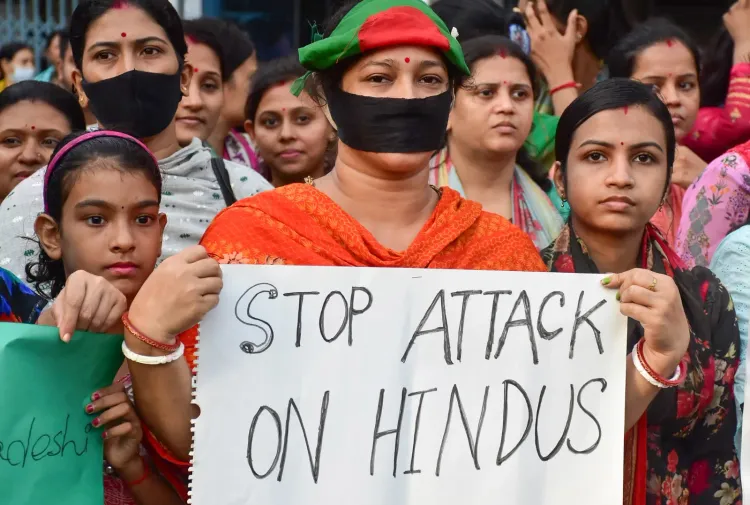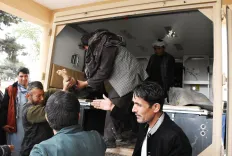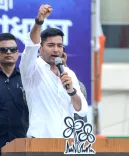Is Religious Fanaticism Unchecked in Bangladesh Under Yunus?

Synopsis
Key Takeaways
- Hindus face ongoing violence in Bangladesh, with numerous attacks reported.
- The interim government under Muhammad Yunus is linked to extremist groups.
- International silence raises concerns about human rights violations.
- Protests from the Hindu community highlight their struggle for safety.
- Urgent action is needed to protect religious minorities.
Dhaka: The global community is quietly observing the ongoing genocide against Hindus in Bangladesh. Following the jihadist-supported coup in August 2024 that removed former Prime Minister Sheikh Hasina, Hindus have been facing a continuous surge of violence. Frequent attacks on residences, businesses, looting, arson, theft, vandalism, and the desecration of deities and temples belonging to religious minorities have become commonplace under the interim government led by Muhammad Yunus. As perceived allies of Hasina, Bangladeshi Hindus are increasingly under threat amidst rising anti-India sentiments.
Since the removal of Hasina, the Yunus administration has allied with Hefazat-e-Islam (HeI), a radical extremist group advocating for Sharia Law, gender segregation, and the persecution of Ahmadiyyas and Christian preachers while supporting the death penalty for blasphemy.
Moreover, the Yunus government has legitimized the Jamaat-e-Islami (JeI). In May, Jashimuddin Rahmani from Ansarullah Bangla Team (ABT) and Harun Izhar, a leader of Lashkar-e-Taiba in Bangladesh, were publicly visible leading an anti-Awami League rally in Dhaka’s Shahbagh. Hizb-ut-Tahrir (HuT) has openly called for establishing a caliphate and incited actions against India.
The Yunus regime has targeted Bangladesh’s largest secular party using the Anti-Terrorism Act, while globally recognized terrorists now hold prominent positions. Bangladesh’s interim legal advisor Asif Nazrul met with top LeT jihadist Harun Izhar on April 22, just hours after a tragic terrorist incident in Jammu and Kashmir.
The present government in Bangladesh is intentionally empowering Islamist-jihadist groups with extreme ideologies aimed at Hindus and other minorities. In June, the Durga temple in Khilkhet was demolished without prior notice. A Hindu residence in Thakurtala village in Chittagong district was also set ablaze by radical Islamists. The army, police, and jihadis are now actively involved in ethnic cleansing, with Hindus facing murder, rape, and persecution.
Bhabesh Chandra Roy, a notable leader in the Hindu community, was reportedly abducted and beaten to death in Dinajpur on April 17. Recently, radical Islamists attacked a Hindu neighborhood in Aldadpur Balapara in Rangpur over unfounded blasphemy allegations, rallying locals using loudspeakers.
This pattern of violence is distressingly familiar. Just two months prior, on May 22, extremists attacked the Hindu-majority village of Dahar Moshiyahati in Jessore district, using similar blasphemy claims to burn down homes and displace numerous Hindu families.
Mobs are strategically targeting Hindu homes, with leaders from Jamaat and the National Citizens Party (NCP) reportedly threatening Hindu women. As the global community remains indifferent, many Hindu families are contemplating fleeing to India in fear.
In the absence of an elected government, approximately 1,930 individuals were killed in the first six months of this year.
Analyzing the statistics of human rights violations from August 9, 2024, to June 2025 reveals a disturbing connection of hatred and genocide occurring in Bangladesh.
The Yunus regime, operating without a transparent democratic process, is rapidly becoming authoritarian.
According to the Bangladesh Hindu Bouddha Christian Oikya Parishad (BHBCUC), there were at least 260 incidents of violence, including 28 murders, 20 incidents of violence against women (including rape), and 60 attacks on religious sites involving theft, vandalism, and arson in the first half of this year. The forceful seizure of Hindu properties, including homes, lands, and businesses, continues unabated.
The interim government’s blatant disregard for minority rights is evident in its exclusionary policies. Reform committees lack Hindu and indigenous representation. This sinister agenda is reflected in systemic oppression. Yunus' regime appears to be inciting communal violence to divert attention from pressing issues. From the Razakars of 1971 to the proxies of unelected Yunus in 2025, the objective remains unchanged: to eradicate the Hindu community and obliterate their identity.
Since Hasina’s ousting in August 2024, Hindus have endured over 2,450 attacks. In November 2024, around 30,000 Hindus protested in Chattogram, demanding government protection from violence and harassment. Protesters urged the interim administration to withdraw sedition charges against 19 Hindu leaders arrested for disrespecting the Bangladesh flag during a prior protest.
Chinmoy Krishna Das Brahmachari, a prominent Vaishnavite leader and former ISKCON monk, has been imprisoned on sedition charges for months, with his bail petition repeatedly denied by the Chattogram court.
Recently, the United States Commission on International Religious Freedom (USCIRF) published a report on Bangladesh, raising concerns about religious freedom in the nation. The findings highlighted observations from USCIRF delegations and expressed fears among religious minorities about openly practicing their faith and safety.
Many Bangladeshi citizens are calling for an end to the unelected and unconstitutional interim government. Yunus, seen as a lost navigator, is steering Bangladesh back into the turbulent waters of jihadist extremism.
(The author is a South Asia and Eurasia expert, previously affiliated with the Manohar Parrikar Institute for Defence Studies and Analyses. The views expressed are personal.)








